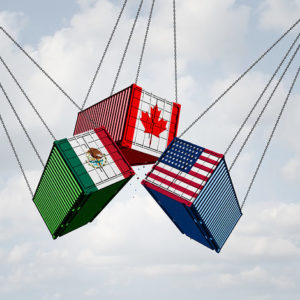The Senate recently passed the United States-Mexico-Canada Agreement (USMCA), a remarkable bipartisan achievement in our polarized times, that modernizes NAFTA for the 21st century.
This agreement, encompassing cross-border trade, intellectual property rights, digital rules, small business promotion and energy, further integrates the economies of North America. However, before official Washington moves onto the next drama, I hope we reflect on the achievement — and then build on it by re-embracing America’s role throughout the Western Hemisphere.
That’s why the American Security Project, which I lead, will initiate our new Latin American Security Council this year to explore the ways to build security and prosperity in our hemisphere.
The United States uses agreements like USMCA to ensure close international relationships, while building our economy. The completion of NAFTA in 1994 cemented Mexico as a close ally and partner of the United States.
While there are certainly security problems along the border relating to criminal drug cartels, imagine how much worse the problem would be if American security personnel were not deeply integrated within Mexico. Now, with the implementation of USMCA, it’s time to renew American leadership in the Americas.
USMCA is an agreement to retain the trilateral free trade in North America among the United States, Canada and Mexico. In constructing and joining the USMCA pact, the United States has created a more stable business environment allowing for greater foreign investment and business collaboration across borders. In fact, research has shown that increased trade is an important way to bring allies into closer alignment on unrelated issues.
USMCA was a remarkable return to bipartisanship in foreign and economic policy. Promoting economic growth at home while drawing closer relationships with partners used to be a core value of America’s long-term consensus on national security.
House Speaker Nancy Pelosi and U.S. Trade Representative Robert Lighthizer should be commended for developing a plan that allowed ad-hoc congressional committees to consider and discuss each aspect of the USMCA deal — allowing skeptics to have their voices heard, while also allowing swing-vote members the opportunity to determine what they would need to pass the bill. This process could help reforge a bipartisan consensus on foreign policy.
Additionally, we should credit the Mexican government for increasing its ambition and funding toward labor rights and enforcement. Members of Congress needed assurance that Mexico will be able to enforce the strict labor rights it agreed to in USMCA.
This remarkable bipartisan, cross-border dialogue is a model for how to embed American values throughout the hemisphere. USMCA includes more than just the traditional protections on business investment and trade concessions: it includes robust protections for labor and the environment. While USMCA will maintain the duty-free physical trade between the three countries, it will also embed critical American values within our neighbors.
One area to highlight is in energy policy. NAFTA had allowed oil and gas markets across North America to become much more integrated. While there was free trade in energy products, Mexican policy had restricted investments in the energy sector to just the Mexican governments.
Reforms leading up to USMCA had allowed increased cross-border investments that allowed American firms to invest in Mexican energy production. Crucially, these investments allow greater cross-border flows of clean electricity produced by renewable investments.
A robust energy sector between the three countries provides the foundation for a healthy manufacturing industry. Likewise, a growing renewable energy sector will ensure that we can meet our climate commitments without harming economic growth.
Without affordable, accessible energy, cross-border industries like medical devices, aviation and automobiles are nothing. Passing a free trade agreement that protects energy and the environment is essential to continued prosperity.
The USMCA should become a model for how to sustain economic growth while building closer American partnerships in North America. The partnerships that the United States has built through other trade agreements, like the counties in the Dominican Republic–Central America Free Trade Agreement and the bilateral agreements with Colombia, Peru, Chile and Panama should be a starting point for further integration with U.S. values.
As turmoil and partisanship ticks ever higher in Congress, passage of USMCA makes clear that Congress, as a co-equal branch of government, can take the lead on legislation that would support our economy and our security.
Free-trade and American prosperity is not a partisan issue. Over the coming year, the American Security Project will work with its stakeholders and partners to more thoroughly explore how to build on this success. As we convene our new Latin American Security Council, the lessons from passage of USMCA will provide a model for rebuilding the bipartisan foreign policy consensus in Congress.

